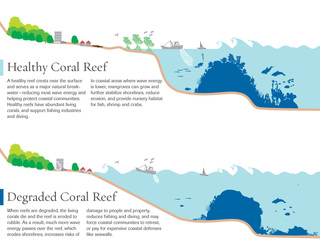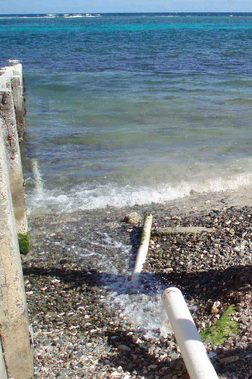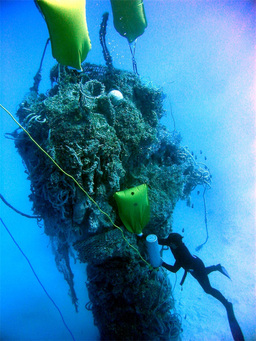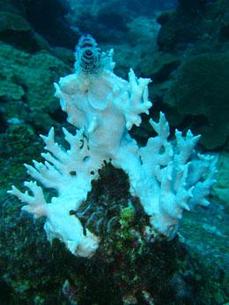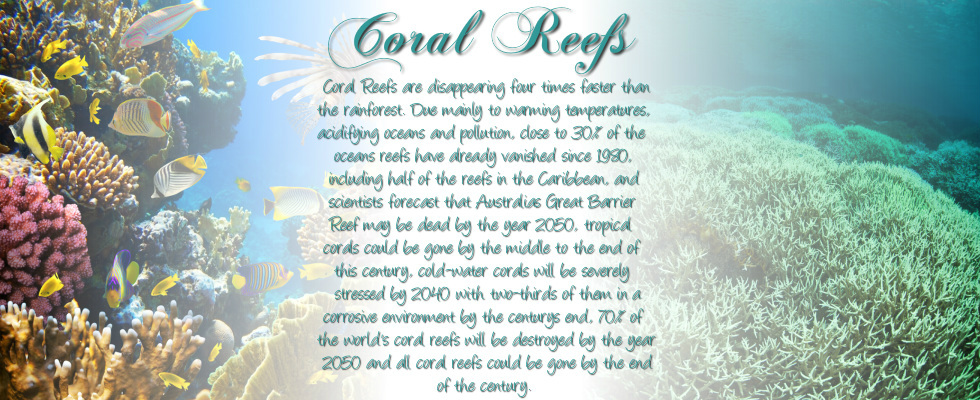
Coral Reefs
Coral reefs, also known as "rainforests of the sea," are among of the oldest ecosystems on Earth
covering less than 1% of the Earths surface, but providing habitat for 25% of all marine life, supporting a phenomenal diversity of species and producing irreplaceable sources of food, shelter, income and medicines. Coral reefs are not only an integral part of the marine ecosystem, but for human society as well
providing around $375 billion annually around the world in goods and services and producing more than half of gross national product for countries with coral reef industries
with at least
500 million people relying on coral reefs for food, coastal protection, lucrative fisheries and tourism industry, subsistence used in the treatment of cancer, cardiovascular disease, HIV, ulcers and other ailments, and livelihoods. Throughout the world,
overfishing,
water pollution,
destructive fishing practices, careless tourism, sedimentation and coral mining
remain primary causes of coral reef degradation and loss. Moreover,
increasingly acidic oceans
due to
warming temperatures
is the primary cause for
'coral reefs bleaching to death', known as coral bleaching, which is how corals receive their ghostly white color and consequently, a
decrease in coral growth, reduction in reproductive capabilities, weaker ecosystem resilience and a degradation of the reefs diversity and productivity, leading to a very weak state and in many cases, death.
An estimated 80% of ocean pollution comes from the land.
With expanding human coastal populations, the
runoff from land and development also expands, altering the landscape and sea, and carrying with it
high levels of toxic pollutants, such as petroleum products and pesticides
from agricultural areas and sewage outflows,
threatening the health of coral reefs. In addition,
marine debris, including plastics such as bags and fishing lines, glass, metal and rubber also affects reefs in many areas, killing several reef species. However, perhaps the greatest challenge corals face is the
acidification of the oceans, which has increased exponentially since the beginning of the industrial revolution and is literally dissolving and eating away coral reefs, bottom-dwelling shellfish and crustaceans, which maintain the basal level of the oceanic food chain, and ocean beds all over the world. Coral Reefs are disappearing
four times faster
than the rainforest. A
report
from the International Union for Conservation of Nature (IUCN) finds that there is just 8% of live coral cover on Caribbean reefs on average, compared to more than 50% in the 1970s. Due mainly to warming temperatures, acidifying oceans and pollution, close to
30% of the ocean’s reefs have already vanished since 1980, including half of the reefs in the Caribbean, and scientists forecast that
Australia’s Great Barrier Reef may be dead by the year 2050,
tropical corals could be gone by the middle to the end of this century, cold-water corals will be
severely stressed by 2040 with two-thirds of them in a corrosive environment by the century’s end,
70% of the world's coral reefs will be destroyed by the year 2050
and
all coral reefs could be gone by the end of the century
(see also).
Learn more.
“There is no way out, no loopholes. The Great Barrier Reef will be over within 20 years or so. Once carbon dioxide had hit the levels predicted for between 2030 and 2060, all coral reefs were doomed to extinction. They would be the world’s first global ecosystem to collapse. I have the backing of every coral reef scientist, every research organization. I’ve spoken to them all. This is critical. This is reality.” ~ Charlie Veron, World Renowned Coral Reef Specialist
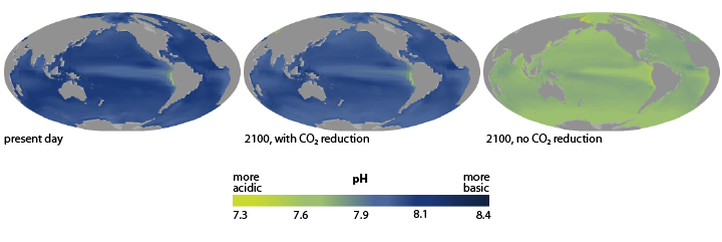
Image by NOAA Climate Services: Ocean Acidification Today and in the Future | Click for source
A major 23-author science paper published in Science, states the world’s oceans may be turning acidic faster today from human carbon emissions than they did during four major extinctions in the last 300 million years, when natural pulses of carbon sent global temperatures soaring.
Learn more.
"Since I started diving in the 1960s up to 50% of the world's coral reefs have been lost. The remaining reefs are either severely threatened or dying and we may lose them all before 2050 - unless we act now." ~
David Hannan, Diver & Cinematographer,
Ocean Ark Alliance
"Coral reefs provide protection and shelter for many different species of fish. They are very important in controlling how much carbon dioxide is in the water and protect coasts from strong currents and waves by slowing down the water before it gets to the shore, hence the term "barrier reefs." Reef fish and mollusks feed 30-40 million people every year and are a crucial source of income. Without coral, the amount of carbon dioxide would rise drastically and that would affect all living things on Earth." ~ Ted Danson, Oceana
Properly managed, coral reefs can yield an average 15 tons of fish and other seafood per square kilometer per year.
Learn more.
A new report
from the International Union for Conservation of Nature (IUCN) finds that there is just 8% of live coral cover on Caribbean reefs on average, compared to more than 50% in the 1970s.
Learn more.
| |
"Coral reefs provide protection and shelter for many different species of fish. They are very important in controlling how much carbon dioxide is in the water and protect coasts from strong currents and waves by slowing down the water before it gets to the shore, hence the term "barrier reefs." Reef fish and mollusks feed 30-40 million people every year and are a crucial source of income. Without coral, the amount of carbon dioxide would rise drastically and that would affect all living things on Earth." ~
Ted Danson, Oceana
See Also:
2012 World Risk Report
"Pollution, overfishing and overuse have put many of our unique reefs at risk. Their disappearance would destroy the habitat of countless species. It would unravel the web of marine life that holds the potential for new chemicals, new medicines, unlocking new mysteries. It would have a devastating effect on the coastal communities from Cairns to Key West, Florida -- communities whose livelihood depends upon the reefs." ~ Former U.S. President Bill Clinton

